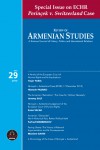It has been an orchestrated practice to accuse Turkish views on historical events of the First World War, particularly on the Eastern Anatolian Front and on the Armenian allegations pertaining there to, as being denialist or negationist. Fueled by religious bonds and the psychological burden of having made unfulfilled promises to incite the Armenian population of the Ottoman empire to armed rebellion against the state, the political alliances of current times appear to continue, one hundred years after the First World War, to castigate the successor state of the Ottomans, the Republic of Turkey and its people, the Turks.
Indeed, the Armenian allegations have found a fertile ground to propagate their version of wartime tragedies in a completely one sided manner, singling themselves out as the only victims in the global turmoil. Over the century, this version of history has become the one single myth to forge a diaspora identity as well as a means of livelihood for many. The Republic of Turkey on the other hand, having been born from the ashes of a collapsed empire, in dire struggle for survival to reach contemporary level of civilization, utilizing all its resources forward to the future than taking issues with the past, was compelled to start refuting those allegations very late in the process, may be the last twenty-five years at most.
Hence, politically, particularly vis-à-vis those states with an established Armenian diaspora, Turkey continues to encounter unjustified, biased, uncorroborated accusations. However and fortunately, history cannot be based on hearsay or one sided memory. It is derived from concrete evidence kept in the archives. As such, there are now academicians, scholars of international reputation who have come up with a balanced, objective account of historical facts, exonerating Turkey of fanatical, hate-mongering allegations.
Accusations of denialism or negationism against Turkish views are also refuted on the legal, judicial front. One recent, spectacular instance is the judgment of the very prestigious international tribunal, the “European Court of Human Rights” (ECtHR) of the 47-member Council of Europe. ECtHR confirmed in its 17 December 2013 verdict, the right of Dr. Perinçek, within freedom of thought and expression, to call Armenian allegations as an “international lie”.
This special issue of the “Review of Armenian Studies” is dedicated to the analysis and significance of the 17 December 2013 judgment of the European Court of Human Rights on the Perinçek case. Prominent personalities and scholars assess aspects of the judgment. H.E. Yaşar Yakış analyses the judgment, concluding that the verdict does not mean that the court rejects Armenian claims; rather it upholds the principle of freedom of expression. Professor Dr. Hüseyin Pazarcı focuses on the application of Switzerland for a review of the case by the Grand Chamber of the Court. Ambassador (R) Pulat Tacar points that the Court verdict underlines that expressing opinions on sensitive and debated issues is a fundamental aspect of freedom of expression, and the difference between tolerant, pluralist and democratic society and totalitarian regimes lies in this. Dr. Farhad Mammadov argues that Armenian allegations cannot be considered as historical facts but a political mythology. Academician Maxime Gauin depicts the court decision as a major victory for freedom of speech and praises its recognition of the scholarly debate on the Armenian question. The book review is on the latest work of historian Edward J. Erickson “Ottomans and Armenians: A Study in Counterinsurgency” by Prof. Jeremy Salt. The special issue is also supplemented with a chronology of the case of Perinçek v. Switzerland.
Alev KILIÇ
Director of Center for Eurasian Studies
(İÇİNDEKİLER)
Foreword.................................................................................................................................................5
(Önsöz)
ARTICLES.................................................................................................................................................................7
(MAKALELER)
A Verdict of the European Court of Human Rights and Its Implications..................................................7
(Avrupa İnsan Hakları Mahkemesiʼnin Bir Kararı ve Bu Kararın Yansımaları)
Yaşar YAKIŞ
Perinçek v. Switzerland Case (ECHR, 17 December 2013) ....................................................................27
(Perinçek v. Switzerland Davası (AİHM, 17 Aralık 2013))
Prof. Dr. Hüseyin PAZARCI
The Armenian ʻRelocationʼ: The Case for ʻMilitary Necessityʼ...............................................................65
(Ermeni Tehciri: ʻAskeri Mecburiyetʼ Gerekçesi)
Assoc. Prof. Dr. Jeremy SALT
Perinçek v. Switzerland Judgement of the
European Court of Human Rights .........................................................................................................77
(Avrupa İnsan Hakları Mahkemesiʼnin Perinçek v. İsviçre Kararı)
Pulat TACAR
Armenian “Genocide”: Not A Historical Fact, Rather Political Myth...................................................115
(Ermeni “Soykırımı”: Tarihsel Bir Gerçek Değil, Siyasi Bir Masal)
Dr. Farhad MAMMADOV
Facing Liberty: The Victory of Rational
Argumentation and Its Consequences................................................................................................127
(Özgürlükle Yüzleşmek: Rasyonel Tartışmanın Zaferi ve Bunun Sonuçları)
Maxime GAUIN
CHRONOLOGY.............................................................................................................................................................149
(KRONOLOJİ)
Perinçek v. Switzerland........................................................................................................................149
(Bir Perinçek v İsviçre Davası Kronolojisi)
Yaşar YAKIŞ
Prof. Dr. Hüseyin PAZARCI
Assoc. Prof. Dr. Jeremy SALT
Pulat TACAR
Dr. Farhad MAMMADOV
Maxime GAUIN


